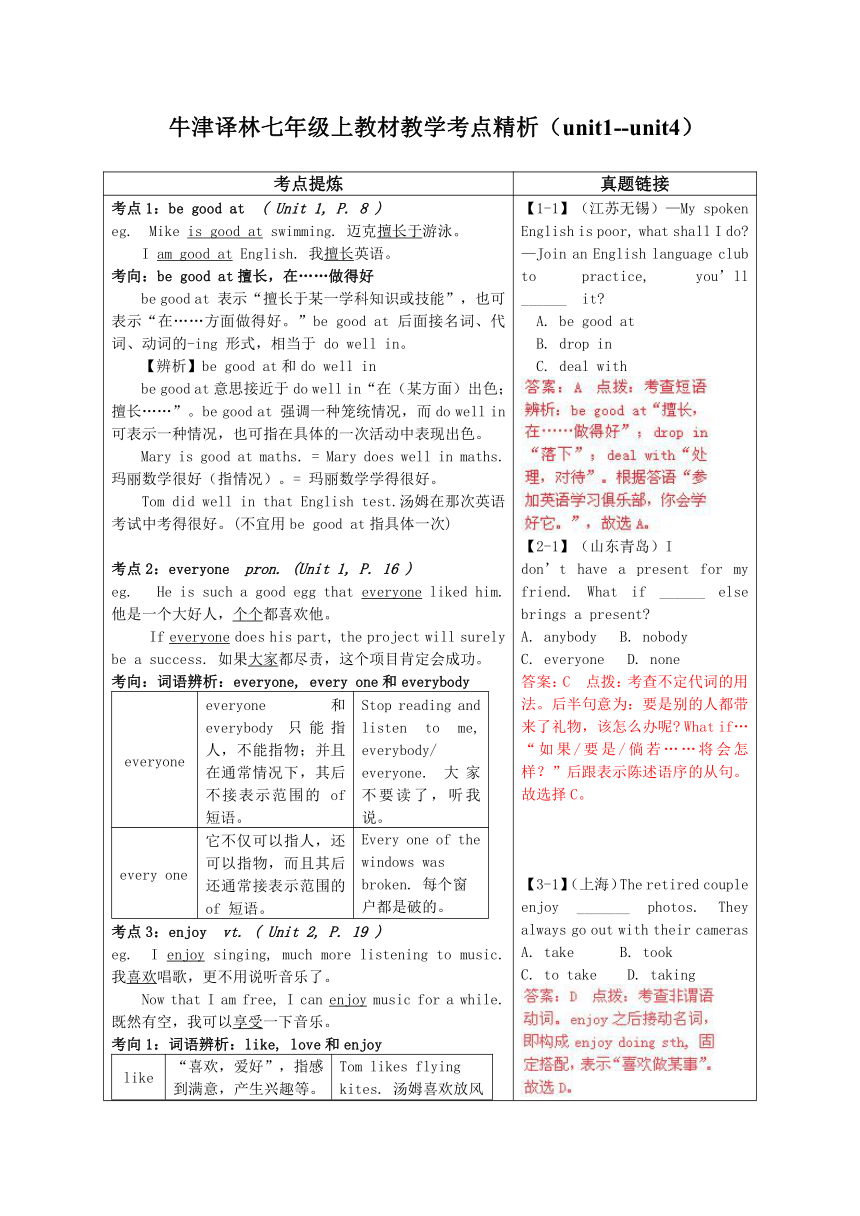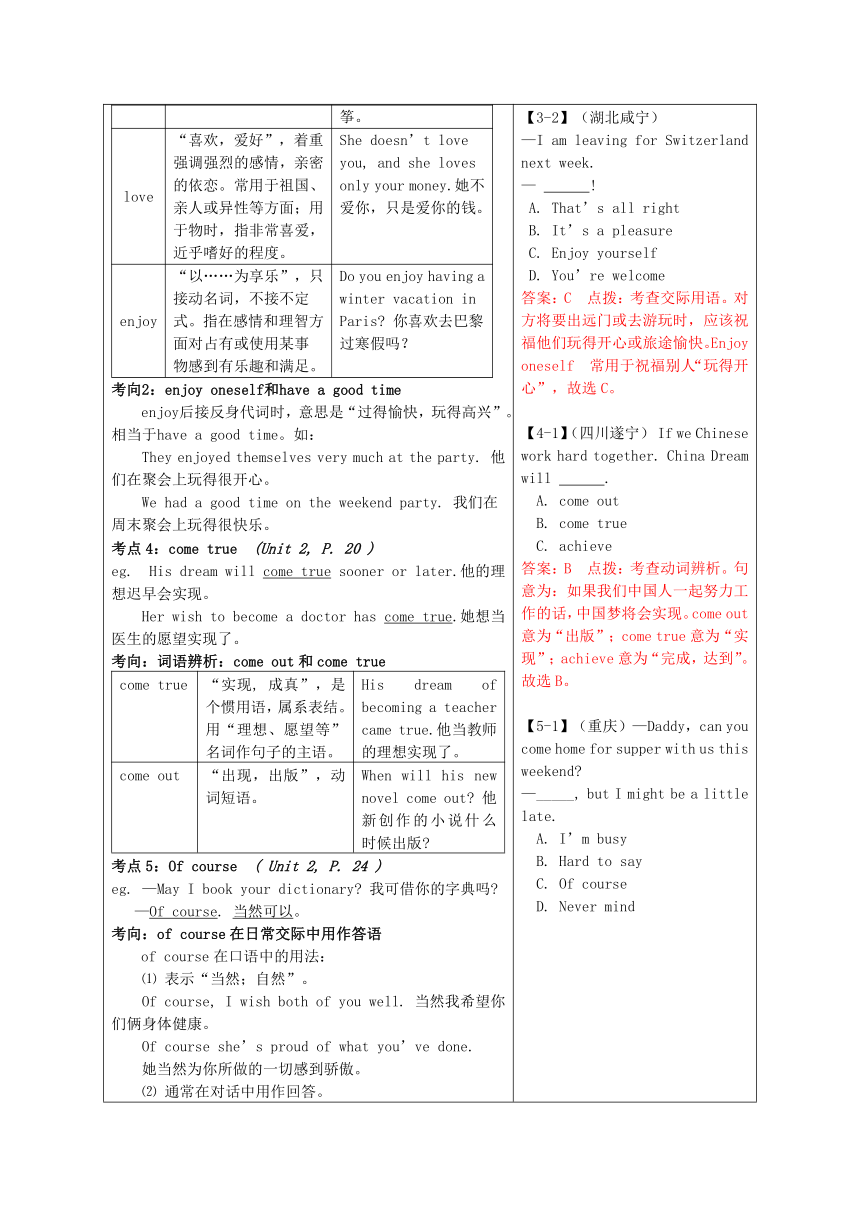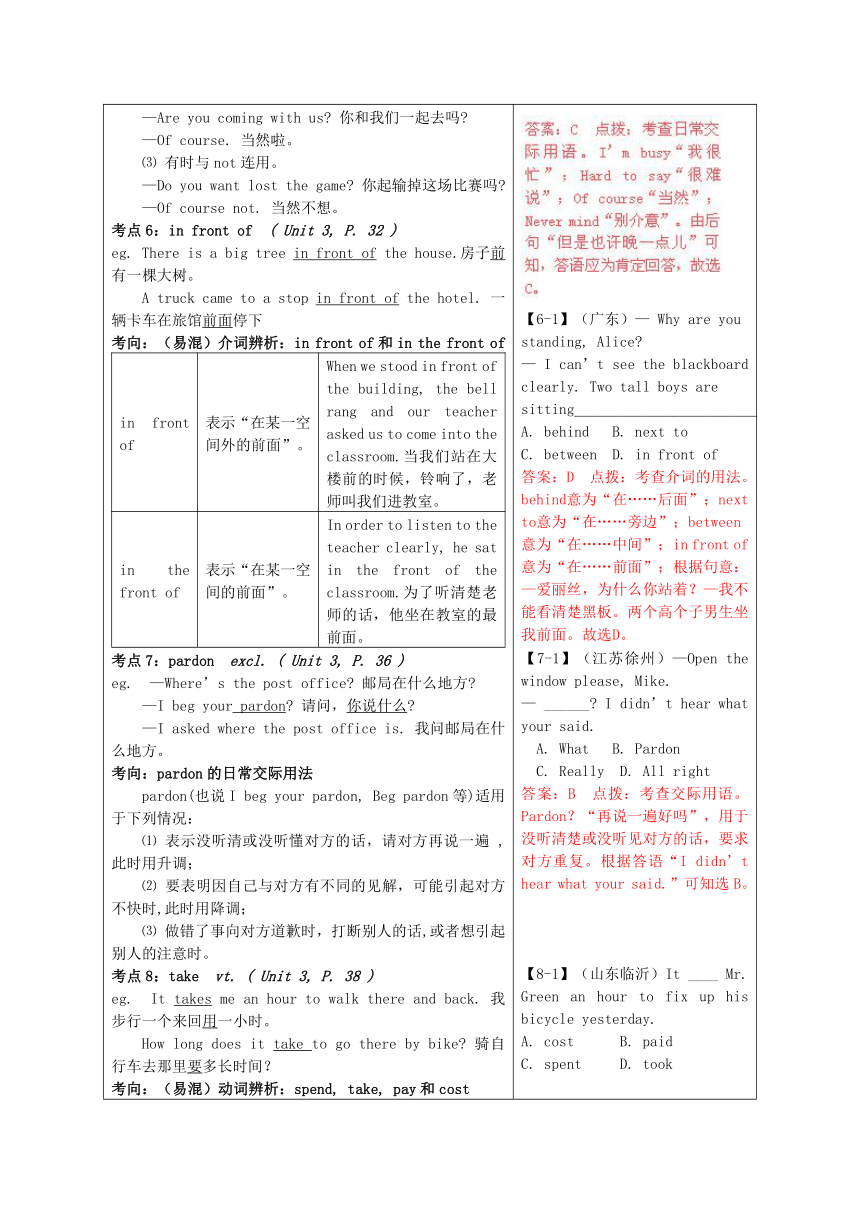牛津译林版英语七年级上教材教学考点精析(unit1--unit4)
文档属性
| 名称 | 牛津译林版英语七年级上教材教学考点精析(unit1--unit4) |  | |
| 格式 | zip | ||
| 文件大小 | 157.8KB | ||
| 资源类型 | 教案 | ||
| 版本资源 | 牛津译林版 | ||
| 科目 | 英语 | ||
| 更新时间 | 2016-07-23 23:00:59 | ||
图片预览



文档简介
牛津译林七年级上教材教学考点精析(unit1--unit4)
考点提炼
真题链接
考点1:be
good
at
(
Unit
1,
P.
8
)eg.
Mike
is
good
at
swimming.
迈克擅长于游泳。I
am
good
at
English.
我擅长英语。考向:be
good
at擅长,在……做得好be
good
at
表示“擅长于某一学科知识或技能”,也可表示“在……方面做得好。”be
good
at
后面接名词、代词、动词的-ing
形式,相当于
do
well
in。【辨析】be
good
at和do
well
inbe
good
at意思接近于do
well
in“在(某方面)出色;擅长……”。be
good
at
强调一种笼统情况,而do
well
in可表示一种情况,也可指在具体的一次活动中表现出色。Mary
is
good
at
maths.
=
Mary
does
well
in
maths.
玛丽数学很好(指情况)。=
玛丽数学学得很好。Tom
did
well
in
that
English
test.汤姆在那次英语考试中考得很好。(不宜用be
good
at指具体一次)考点2:everyone
pron.
(Unit
1,
P.
16
)eg.
He
is
such
a
good
egg
that
everyone
liked
him.他是一个大好人,个个都喜欢他。If
everyone
does
his
part,
the
project
will
surely
be
a
success.
如果大家都尽责,这个项目肯定会成功。考向:词语辨析:everyone,
every
one和everybodyeveryoneeveryone
和
everybody
只能指人,不能指物;并且在通常情况下,其后不接表示范围的
of
短语。Stop
reading
and
listen
to
me,
everybody/
everyone.
大家不要读了,听我说。every
one它不仅可以指人,还可以指物,而且其后还通常接表示范围的
of
短语。Every
one
of
the
windows
was
broken.
每个窗户都是破的。考点3:enjoy
vt.
(
Unit
2,
P.
19
)eg.
I
enjoy
singing,
much
more
listening
to
music.我喜欢唱歌,更不用说听音乐了。Now
that
I
am
free,
I
can
enjoy
music
for
a
while.
既然有空,我可以享受一下音乐。考向1:词语辨析:like,
love和enjoylike“喜欢,爱好”,指感到满意,产生兴趣等。Tom
likes
flying
kites.
汤姆喜欢放风筝。love“喜欢,爱好”,着重强调强烈的感情,亲密的依恋。常用于祖国、亲人或异性等方面;用于物时,指非常喜爱,近乎嗜好的程度。She
doesn’t
love
you,
and
she
loves
only
your
money.她不爱你,只是爱你的钱。enjoy“以……为享乐”,只接动名词,不接不定式。指在感情和理智方面对占有或使用某事物感到有乐趣和满足。Do
you
enjoy
having
a
winter
vacation
in
Paris
你喜欢去巴黎过寒假吗?考向2:enjoy
oneself和have
a
good
timeenjoy后接反身代词时,意思是“过得愉快,玩得高兴”。相当于have
a
good
time。如:They
enjoyed
themselves
very
much
at
the
party.
他们在聚会上玩得很开心。We
had
a
good
time
on
the
weekend
party.
我们在周末聚会上玩得很快乐。考点4:come
true
(Unit
2,
P.
20
)eg.
His
dream
will
come
true
sooner
or
later.他的理想迟早会实现。Her
wish
to
become
a
doctor
has
come
true.她想当医生的愿望实现了。考向:词语辨析:come
out和come
truecome
true“实现,
成真”,是个惯用语,属系表结。用“理想、愿望等”名词作句子的主语。His
dream
of
becoming
a
teacher
came
true.他当教师的理想实现了。come
out“出现,出版”,动词短语。When
will
his
new
novel
come
out
他新创作的小说什么时候出版 考点5:Of
course
(
Unit
2,
P.
24
)eg.
—May
I
book
your
dictionary
我可借你的字典吗 —Of
course.
当然可以。考向:of
course在日常交际中用作答语of
course在口语中的用法:⑴
表示“当然;自然”。Of
course,
I
wish
both
of
you
well.
当然我希望你们俩身体健康。Of
course
she’s
proud
of
what
you’ve
done.她当然为你所做的一切感到骄傲。⑵
通常在对话中用作回答。—Are
you
coming
with
us
你和我们一起去吗 —Of
course.
当然啦。⑶
有时与not连用。—Do
you
want
lost
the
game
你起输掉这场比赛吗 —Of
course
not.
当然不想。考点6:in
front
of
(
Unit
3,
P.
32
)eg.
There
is
a
big
tree
in
front
of
the
house.房子前有一棵大树。A
truck
came
to
a
stop
in
front
of
the
hotel.
一辆卡车在旅馆前面停下考向:(易混)介词辨析:in
front
of和in
the
front
ofin
front
of表示“在某一空间外的前面”。When
we
stood
in
front
of
the
building,
the
bell
rang
and
our
teacher
asked
us
to
come
into
the
classroom.当我们站在大楼前的时候,铃响了,老师叫我们进教室。in
the
front
of表示“在某一空间的前面”。In
order
to
listen
to
the
teacher
clearly,
he
sat
in
the
front
of
the
classroom.为了听清楚老师的话,他坐在教室的最前面。考点7:pardon
excl.
(
Unit
3,
P.
36
)eg.
—Where’s
the
post
office
邮局在什么地方 —I
beg
your
pardon
请问,你说什么 —I
asked
where
the
post
office
is.
我问邮局在什么地方。考向:pardon的日常交际用法pardon(也说I
beg
your
pardon,
Beg
pardon等)适用于下列情况:⑴
表示没听清或没听懂对方的话,请对方再说一遍
,此时用升调;⑵
要表明因自己与对方有不同的见解,可能引起对方不快时,此时用降调;⑶
做错了事向对方道歉时,打断别人的话,或者想引起别人的注意时。考点8:take
vt.
(
Unit
3,
P.
38
)eg.
It
takes
me
an
hour
to
walk
there
and
back.
我步行一个来回用一小时。How
long
does
it
take
to
go
there
by
bike
骑自行车去那里要多长时间?考向:(易混)动词辨析:spend,
take,
pay和cost例句:It
took
the
workers
two
years
build
the
bridge.
工人花了两年时间才建成这座桥。The
children
spend
too
much
time
looking
at
television. 孩子们看电视的时间太多了。I
paid
¥350
for
that
new
bike.
我花了三百五十元买了那辆新自行车。The
dictionary
cost
me
50
yuan.
这本字典花了我50元钱。She
spent
all
her
savings
on
a
trip
to
Egypt. 她将全部积蓄都花在去埃及这趟旅行上了。考点9:borrow
vt.
(
Unit
3,
P.
38
)eg.
May
I
borrow
your
roller
skates 我可以借你的旱冰鞋吗?I
suppose
you
want
to
borrow
money
from
me
again
我猜你又要找我借钱了吧 考向1:(易混)动词辨析:borrow和lendborrow是“(主语)借进”;lend是“(主语)借出”。borrow常与from连用,即borrow
sth.
from
sb.(some
place);lend常与to搭配,即lend
sth.
to
sb.也可以说lend
sb.
sth.
如图所示:例句:You
may
borrow
the
book
from
the
library.
你可以从图书馆借这本书。I
have
lent
my
bike
to
Jim.我把自行车借给吉姆了。考向2:延续性动词和非延续性动词borrow和lend都是非延续性动词,不和表示一段时间的状语连用。如果要和一段时间的状语连用,表示借多长时间,要用延续性动词keep或have。 You
may
keep
this
book
for
one
month. 这本书你可以借一个月。I
have
had
the
car
for
two
years.这两小汽车我买两年了。考点10:few
det.&
pron.
(
Unit
4,
P.
40
)eg.
He
has
so
few
friends
that
his
life
is
lonely.他的朋友很少,因此他的生活非常孤单。I’m
going
to
visit
my
aunt
for
a
few
days.
我打算去姑妈家住几天。考向:词语辨析:few,
little,
a
few,
a
littlea
few“少,几个”,修饰可数名词,是none的反义词,表示肯定意义。I
have
a
few
grammar
books
besides
this.
除了这本书,我还有那么几本语法书。few
(adj.)“少,没有多少”,修饰可数名词,是many的反义词,表示否定意义。He
read
many
novels
but
few
poems.
他小说看得多,诗读得少。little(adj.)“少,没有多少”,修饰不可数名词,是much的反义词,表示否定的意义。There
is
little
hope
that
he
will
be
set
free.
他荻释的希望很小。a
little“少,几个”修饰不可数名词,是none的反义词,表示肯定意义。We
still
have
a
little
water
to
drink.我们还有点水喝。考点11:wake
up
vt.
(
Unit
4,
P.
42
)eg.
I
didn’t
wake
up
until
I
heard
the
alarm
clock.
直到听到闹钟的铃声我才醒来。Would
you
please
wake
me
up
tomorrow 请明天叫醒我好吗?考向:wake
up的用法wake
up意为“醒来;叫醒”,是由动词+副词构成的短语,当所带的宾语为代词时,宾语要放在动词和副词之间。如:She
gave
him
a
pinch
on
the
arm
to
wake
him
up.她拧一下他的胳膊把他唤醒。考点12:practise
=practice(美)
v.
(
Unit
4,
P.
44)
eg.
Let’s
practise
speaking
English
every
day.让我们每天都练习说英语吧。Do
you
want
to
practise
still
more
next
Sunday
下个星期日你想加强练习吗 考向:practise=practice的用法及物动词“练习,训练”,
可接名词、代词、动名词或疑问词从句作宾语。It’s
very
important
to
practise
listening.练习听力是非常重要的。不及物动词练习,训练He
go
to
the
gymnasium
to
practise
every
day.他每天都去健身房训练。名词练习,实践Knowledge
is
a
treasure,
but
practise
is
the
key
to
it.知识是一个宝库,而实践却是打开这个宝库的钥匙。考点13:would
like
(
Unit
4,
P.
47)
eg.
Many
people
would
like
to
take
holidays
abroad.
许多人愿意到国外度假。I
would
like
you
to
meet
a
friend
of
mine.
我想让你和我一个朋友见见面。考向1:would
like用法would
like表示“想做某事”,主要用于婉转地提出请求、建议或某种看法,语气比want更委婉。would
like后面一般跟动词不定式,也可以跟事物名词。I
would
like
to
have
a
word
with
you.
我想同你说句话。Would
you
like
some
tomato
juice
你想要些番茄汁吗?考向2:Would
you
like…
的应答语。在表示建议或请求时,Would
you
like… 的肯定回答常说Yes,
please/
Yes,
I’d
love(like)
to;否定回答常说No,
thanks.
如: —Would
you
like
to
go
shopping
with
me 你愿意和我一起去买东西吗? —Yes,
I’d
love
to!
是的,我很原意。 —Would
you
like
a
mooncake 吃块月饼好吗?—No,
thanks.
不用,谢谢。考点14:wish
vt
(
Unit
4,
P.
50)
eg.
How
I
wish
to
have
a
long
vacation
these
days!
这些天我多么希望去度一次长假啊!I
wish
you
wouldn’t
look
down
on
this
kind
of
work.
我希望你不要看不起这种工作。考向:wish表示祝愿wish后面接双宾语时往往表示祝愿;wish后接从句时通常表示很难实现的愿望,因此它后面的从句往往用一般过去时(表示将来很难实现的愿望)。对于别人的祝愿要表示感谢。—I’d
like
to
wish
you
every
success.
我谨祝您一切顺利。—Thank
you.
谢谢!考点15:good
luck
(
Unit
4,
P.
50)
eg.
Good
luck,
and
a
Merry
Christmas
to
all
of
you!
祝大家好运,并祝圣诞快乐!Well,
good
luck
and
have
a
pleasant
journey.
好了,祝你好运并祝旅途愉快。考向:good
luck祝您好运good
luck用于对别人的祝福。Wish
you
good
luck.
祝您好运。—And
I
hope
your
future
engages
will
not
take
place
during
meal
times.
我还希望以后你的婚约不会发生在吃饭的时候。—I’ll
try,
Sir.
我会尽力的,先生。—Good
luck.
祝你好运。—Thank
you,
Sir谢谢,先生
【1-1】(江苏无锡)—My
spoken
English
is
poor,
what
shall
I
do —Join
an
English
language
club
to
practice,
you’ll
______ it A.
be
good
atB.
drop
inC.
deal
with【2-1】(山东青岛)Idon’t
have
a
present
for
my
friend.
What
if
______
else
brings
a
present A.
anybody
B.
nobodyC.
everyone
D.
none答案:C
点拨:考查不定代词的用法。后半句意为:要是别的人都带来了礼物,该怎么办呢
What
if…“如果/要是/倘若……将会怎样?”后跟表示陈述语序的从句。故选择C。【3-1】(上海)The
retired
couple
enjoy
_______
photos.
They
always
go
out
with
their
camerasA.
take
B.
tookC.
to
take
D.
taking【3-2】(湖北咸宁)
—I
am
leaving
for
Switzerland
next
week.—
!A.
That’s
all
rightB.
It’s
a
pleasure C.
Enjoy
yourself D.
You’re
welcome答案:C
点拨:考查交际用语。对方将要出远门或去游玩时,应该祝福他们玩得开心或旅途愉快。Enjoy
oneself 常用于祝福别人“玩得开心”,故选C。【4-1】(四川遂宁)
If
we
Chinese
work
hard
together.
China
Dream
will
.A.
come
out
B.
come
true
C.
achieve答案:B
点拨:考查动词辨析。句意为:如果我们中国人一起努力工作的话,中国梦将会实现。come
out意为“出版”;come
true意为“实现”;achieve意为“完成,达到”。故选B。【5-1】(重庆)—Daddy,can
you
come
home
for
supper
with
us
this
weekend —_____,
but
I
might
be
a
little
late.A.
I’m
busyB.
Hard
to
sayC.
Of
courseD.
Never
mind【6-1】(广东)—
Why
are
you
standing,
Alice —
I
can’t
see
the
blackboard
clearly.
Two
tall
boys
are
sitting
me.A.
behind
B.
next
toC.
between
D.
in
front
of答案:D
点拨:考查介词的用法。behind意为“在……后面”;next
to意为“在……旁边”;between意为“在……中间”;in
front
of意为“在……前面”;根据句意:—爱丽丝,为什么你站着?—我不能看清楚黑板。两个高个子男生坐我前面。故选D。【7-1】(江苏徐州)—Open
the
window
please,
Mike.—
______
I
didn’t
hear
what
your
said.A.
What
B.
PardonC.
Really
D.
All
right答案:B
点拨:考查交际用语。Pardon?“再说一遍好吗”,用于没听清楚或没听见对方的话,要求对方重复。根据答语“I
didn’t
hear
what
your
said.”可知选B。【8-1】(山东临沂)It
____
Mr.
Green
an
hour
to
fix
up
his
bicycle
yesterday.A.
cost
B.
paidC.
spent
D.
took【8-2】(山东青岛)—
How
much
is
the
ticket
to
Central
Park —A
one-way
ticket
_____
$40,
and
you
can
_____
another
$20
for
a
round-trip.A.
costs,
payB.
cost,
spendC.
pay,
spendD.
spends,
pay答案:A
点拨:考查动词辨析。cost“花费”物作主语;spend“花费”人作主语;pay
for付款,人作主语;故选择答案A。【9-1】(浙江宁波)
—Can
I
______
your
bike —With
pleasure.
But
you
mustn’t
______
it
to
others.A.
lend;
borrowB.
borrow;
lendC.
lend;
lendD.
borrow;
borrow答案:B
点拨:考查动词用法辨析。lend“借出”;borrow“借入”。句意为“我能借你的自行车吗?”可知是借对方的东西,用borrow;由第二句中to可知用lend。故选B。【9-2】(辽宁锦州)—Don’t
forger
to
return
the
book
to
the
library.
You
have
______
it
for
two
weeks.—OK.A.
borrowed
B.
hadC.
lent
D.
kept答案:D
点拨:考查延续性动词的用法。for+一段时间要用持续性动词所以排除A、C,根据句意,是保存而不是拥有,故选择D。【10-1】(贵州安顺)The
man
has
_____
friends
in
this
city,
so
he
often
stays
at
home.A.
a
few
B.
fewC.
little
D.
a
little【10-2】(广东广州)There
is
___
news
about
this
movie
star
in
the
newspaper.
Where
can
I
get
some
A.
many
B.
a
fewC.
a
lot
D.
little
答案:D
点拨:采用排除法。考查形容词的用法。news为“新闻”是不可数名词,many,a
few用来修饰可数名词复数,先排除;a
lot后面要加of才能加名词,也被排除。故选D。【11-1】(广东河源)______,
Tom!
It’s
time
to
get
up
and
go
to
school.
A.
Wake
up
B.
Make
upC.
Grow
up
D.
Look
up答案:A
点拨:考查动词短语辨析。句意:汤姆,醒醒!到了起床上学的时间了。wake
up“醒来、叫醒”;make
up“编造、弥补”;grow
up“长大”;look
up,“查找”。根据句意选A【12-1】(黑龙江绥化)一What
do
you
usually
do
in
the
morning 一I
often
practice
______
English.A.
speakB.
to
speak
C.
speaking【13-1】(山东滨州)
—Would
you
like
______
camping
with
me —I’d
like
to.
But
I’m
busy
______
my
homework.A.
to
go;
to
do
B.
to
go;
doingC.
going;
to
do
D.
going;
doing答案:B
点拨:考查非谓语动词。would
like
to
do
sth.想要做某事;be
busy
doing
sth.“忙于做某事。所以选择答案B。【13-2】(江西)—Would
you
like
some
rice
—______.
I’d
rather
have
a
piece
of
bread.A.
Yes,
please
B.
No
problemC.
That’s
OK
D.
No,
thanks答案:D
点拨:考查情景交际。根据答语“我只要一片面包”可知“不要米饭”。Would
you
like…
的否定回答No,
thanks.,故选D。【14-1】(浙江温州)—Wish
you
good
luck
in
this
English
exam.—
A.
That’s
OK.B.
Thank
you.C.
Congratulations!D.
You’re
welcome.【15-1】(山东莱芜)—
I
will
have
a
math
test
tomorrow.
—
______A.
Good
luck!
B.
Thank
you!C.
Well
done!
D.
The
same
to
you!答案:A
点拨:考查日常交际用语。Good
luck!
祝你好运!Thank
you!谢谢!Well
done!
干得好!The
same
to
you!
你也一样!句意为:—明天我数学考试。—祝你好运!所以选择答案A。
考点提炼
真题链接
考点1:be
good
at
(
Unit
1,
P.
8
)eg.
Mike
is
good
at
swimming.
迈克擅长于游泳。I
am
good
at
English.
我擅长英语。考向:be
good
at擅长,在……做得好be
good
at
表示“擅长于某一学科知识或技能”,也可表示“在……方面做得好。”be
good
at
后面接名词、代词、动词的-ing
形式,相当于
do
well
in。【辨析】be
good
at和do
well
inbe
good
at意思接近于do
well
in“在(某方面)出色;擅长……”。be
good
at
强调一种笼统情况,而do
well
in可表示一种情况,也可指在具体的一次活动中表现出色。Mary
is
good
at
maths.
=
Mary
does
well
in
maths.
玛丽数学很好(指情况)。=
玛丽数学学得很好。Tom
did
well
in
that
English
test.汤姆在那次英语考试中考得很好。(不宜用be
good
at指具体一次)考点2:everyone
pron.
(Unit
1,
P.
16
)eg.
He
is
such
a
good
egg
that
everyone
liked
him.他是一个大好人,个个都喜欢他。If
everyone
does
his
part,
the
project
will
surely
be
a
success.
如果大家都尽责,这个项目肯定会成功。考向:词语辨析:everyone,
every
one和everybodyeveryoneeveryone
和
everybody
只能指人,不能指物;并且在通常情况下,其后不接表示范围的
of
短语。Stop
reading
and
listen
to
me,
everybody/
everyone.
大家不要读了,听我说。every
one它不仅可以指人,还可以指物,而且其后还通常接表示范围的
of
短语。Every
one
of
the
windows
was
broken.
每个窗户都是破的。考点3:enjoy
vt.
(
Unit
2,
P.
19
)eg.
I
enjoy
singing,
much
more
listening
to
music.我喜欢唱歌,更不用说听音乐了。Now
that
I
am
free,
I
can
enjoy
music
for
a
while.
既然有空,我可以享受一下音乐。考向1:词语辨析:like,
love和enjoylike“喜欢,爱好”,指感到满意,产生兴趣等。Tom
likes
flying
kites.
汤姆喜欢放风筝。love“喜欢,爱好”,着重强调强烈的感情,亲密的依恋。常用于祖国、亲人或异性等方面;用于物时,指非常喜爱,近乎嗜好的程度。She
doesn’t
love
you,
and
she
loves
only
your
money.她不爱你,只是爱你的钱。enjoy“以……为享乐”,只接动名词,不接不定式。指在感情和理智方面对占有或使用某事物感到有乐趣和满足。Do
you
enjoy
having
a
winter
vacation
in
Paris
你喜欢去巴黎过寒假吗?考向2:enjoy
oneself和have
a
good
timeenjoy后接反身代词时,意思是“过得愉快,玩得高兴”。相当于have
a
good
time。如:They
enjoyed
themselves
very
much
at
the
party.
他们在聚会上玩得很开心。We
had
a
good
time
on
the
weekend
party.
我们在周末聚会上玩得很快乐。考点4:come
true
(Unit
2,
P.
20
)eg.
His
dream
will
come
true
sooner
or
later.他的理想迟早会实现。Her
wish
to
become
a
doctor
has
come
true.她想当医生的愿望实现了。考向:词语辨析:come
out和come
truecome
true“实现,
成真”,是个惯用语,属系表结。用“理想、愿望等”名词作句子的主语。His
dream
of
becoming
a
teacher
came
true.他当教师的理想实现了。come
out“出现,出版”,动词短语。When
will
his
new
novel
come
out
他新创作的小说什么时候出版 考点5:Of
course
(
Unit
2,
P.
24
)eg.
—May
I
book
your
dictionary
我可借你的字典吗 —Of
course.
当然可以。考向:of
course在日常交际中用作答语of
course在口语中的用法:⑴
表示“当然;自然”。Of
course,
I
wish
both
of
you
well.
当然我希望你们俩身体健康。Of
course
she’s
proud
of
what
you’ve
done.她当然为你所做的一切感到骄傲。⑵
通常在对话中用作回答。—Are
you
coming
with
us
你和我们一起去吗 —Of
course.
当然啦。⑶
有时与not连用。—Do
you
want
lost
the
game
你起输掉这场比赛吗 —Of
course
not.
当然不想。考点6:in
front
of
(
Unit
3,
P.
32
)eg.
There
is
a
big
tree
in
front
of
the
house.房子前有一棵大树。A
truck
came
to
a
stop
in
front
of
the
hotel.
一辆卡车在旅馆前面停下考向:(易混)介词辨析:in
front
of和in
the
front
ofin
front
of表示“在某一空间外的前面”。When
we
stood
in
front
of
the
building,
the
bell
rang
and
our
teacher
asked
us
to
come
into
the
classroom.当我们站在大楼前的时候,铃响了,老师叫我们进教室。in
the
front
of表示“在某一空间的前面”。In
order
to
listen
to
the
teacher
clearly,
he
sat
in
the
front
of
the
classroom.为了听清楚老师的话,他坐在教室的最前面。考点7:pardon
excl.
(
Unit
3,
P.
36
)eg.
—Where’s
the
post
office
邮局在什么地方 —I
beg
your
pardon
请问,你说什么 —I
asked
where
the
post
office
is.
我问邮局在什么地方。考向:pardon的日常交际用法pardon(也说I
beg
your
pardon,
Beg
pardon等)适用于下列情况:⑴
表示没听清或没听懂对方的话,请对方再说一遍
,此时用升调;⑵
要表明因自己与对方有不同的见解,可能引起对方不快时,此时用降调;⑶
做错了事向对方道歉时,打断别人的话,或者想引起别人的注意时。考点8:take
vt.
(
Unit
3,
P.
38
)eg.
It
takes
me
an
hour
to
walk
there
and
back.
我步行一个来回用一小时。How
long
does
it
take
to
go
there
by
bike
骑自行车去那里要多长时间?考向:(易混)动词辨析:spend,
take,
pay和cost例句:It
took
the
workers
two
years
build
the
bridge.
工人花了两年时间才建成这座桥。The
children
spend
too
much
time
looking
at
television. 孩子们看电视的时间太多了。I
paid
¥350
for
that
new
bike.
我花了三百五十元买了那辆新自行车。The
dictionary
cost
me
50
yuan.
这本字典花了我50元钱。She
spent
all
her
savings
on
a
trip
to
Egypt. 她将全部积蓄都花在去埃及这趟旅行上了。考点9:borrow
vt.
(
Unit
3,
P.
38
)eg.
May
I
borrow
your
roller
skates 我可以借你的旱冰鞋吗?I
suppose
you
want
to
borrow
money
from
me
again
我猜你又要找我借钱了吧 考向1:(易混)动词辨析:borrow和lendborrow是“(主语)借进”;lend是“(主语)借出”。borrow常与from连用,即borrow
sth.
from
sb.(some
place);lend常与to搭配,即lend
sth.
to
sb.也可以说lend
sb.
sth.
如图所示:例句:You
may
borrow
the
book
from
the
library.
你可以从图书馆借这本书。I
have
lent
my
bike
to
Jim.我把自行车借给吉姆了。考向2:延续性动词和非延续性动词borrow和lend都是非延续性动词,不和表示一段时间的状语连用。如果要和一段时间的状语连用,表示借多长时间,要用延续性动词keep或have。 You
may
keep
this
book
for
one
month. 这本书你可以借一个月。I
have
had
the
car
for
two
years.这两小汽车我买两年了。考点10:few
det.&
pron.
(
Unit
4,
P.
40
)eg.
He
has
so
few
friends
that
his
life
is
lonely.他的朋友很少,因此他的生活非常孤单。I’m
going
to
visit
my
aunt
for
a
few
days.
我打算去姑妈家住几天。考向:词语辨析:few,
little,
a
few,
a
littlea
few“少,几个”,修饰可数名词,是none的反义词,表示肯定意义。I
have
a
few
grammar
books
besides
this.
除了这本书,我还有那么几本语法书。few
(adj.)“少,没有多少”,修饰可数名词,是many的反义词,表示否定意义。He
read
many
novels
but
few
poems.
他小说看得多,诗读得少。little(adj.)“少,没有多少”,修饰不可数名词,是much的反义词,表示否定的意义。There
is
little
hope
that
he
will
be
set
free.
他荻释的希望很小。a
little“少,几个”修饰不可数名词,是none的反义词,表示肯定意义。We
still
have
a
little
water
to
drink.我们还有点水喝。考点11:wake
up
vt.
(
Unit
4,
P.
42
)eg.
I
didn’t
wake
up
until
I
heard
the
alarm
clock.
直到听到闹钟的铃声我才醒来。Would
you
please
wake
me
up
tomorrow 请明天叫醒我好吗?考向:wake
up的用法wake
up意为“醒来;叫醒”,是由动词+副词构成的短语,当所带的宾语为代词时,宾语要放在动词和副词之间。如:She
gave
him
a
pinch
on
the
arm
to
wake
him
up.她拧一下他的胳膊把他唤醒。考点12:practise
=practice(美)
v.
(
Unit
4,
P.
44)
eg.
Let’s
practise
speaking
English
every
day.让我们每天都练习说英语吧。Do
you
want
to
practise
still
more
next
Sunday
下个星期日你想加强练习吗 考向:practise=practice的用法及物动词“练习,训练”,
可接名词、代词、动名词或疑问词从句作宾语。It’s
very
important
to
practise
listening.练习听力是非常重要的。不及物动词练习,训练He
go
to
the
gymnasium
to
practise
every
day.他每天都去健身房训练。名词练习,实践Knowledge
is
a
treasure,
but
practise
is
the
key
to
it.知识是一个宝库,而实践却是打开这个宝库的钥匙。考点13:would
like
(
Unit
4,
P.
47)
eg.
Many
people
would
like
to
take
holidays
abroad.
许多人愿意到国外度假。I
would
like
you
to
meet
a
friend
of
mine.
我想让你和我一个朋友见见面。考向1:would
like用法would
like表示“想做某事”,主要用于婉转地提出请求、建议或某种看法,语气比want更委婉。would
like后面一般跟动词不定式,也可以跟事物名词。I
would
like
to
have
a
word
with
you.
我想同你说句话。Would
you
like
some
tomato
juice
你想要些番茄汁吗?考向2:Would
you
like…
的应答语。在表示建议或请求时,Would
you
like… 的肯定回答常说Yes,
please/
Yes,
I’d
love(like)
to;否定回答常说No,
thanks.
如: —Would
you
like
to
go
shopping
with
me 你愿意和我一起去买东西吗? —Yes,
I’d
love
to!
是的,我很原意。 —Would
you
like
a
mooncake 吃块月饼好吗?—No,
thanks.
不用,谢谢。考点14:wish
vt
(
Unit
4,
P.
50)
eg.
How
I
wish
to
have
a
long
vacation
these
days!
这些天我多么希望去度一次长假啊!I
wish
you
wouldn’t
look
down
on
this
kind
of
work.
我希望你不要看不起这种工作。考向:wish表示祝愿wish后面接双宾语时往往表示祝愿;wish后接从句时通常表示很难实现的愿望,因此它后面的从句往往用一般过去时(表示将来很难实现的愿望)。对于别人的祝愿要表示感谢。—I’d
like
to
wish
you
every
success.
我谨祝您一切顺利。—Thank
you.
谢谢!考点15:good
luck
(
Unit
4,
P.
50)
eg.
Good
luck,
and
a
Merry
Christmas
to
all
of
you!
祝大家好运,并祝圣诞快乐!Well,
good
luck
and
have
a
pleasant
journey.
好了,祝你好运并祝旅途愉快。考向:good
luck祝您好运good
luck用于对别人的祝福。Wish
you
good
luck.
祝您好运。—And
I
hope
your
future
engages
will
not
take
place
during
meal
times.
我还希望以后你的婚约不会发生在吃饭的时候。—I’ll
try,
Sir.
我会尽力的,先生。—Good
luck.
祝你好运。—Thank
you,
Sir谢谢,先生
【1-1】(江苏无锡)—My
spoken
English
is
poor,
what
shall
I
do —Join
an
English
language
club
to
practice,
you’ll
______ it A.
be
good
atB.
drop
inC.
deal
with【2-1】(山东青岛)Idon’t
have
a
present
for
my
friend.
What
if
______
else
brings
a
present A.
anybody
B.
nobodyC.
everyone
D.
none答案:C
点拨:考查不定代词的用法。后半句意为:要是别的人都带来了礼物,该怎么办呢
What
if…“如果/要是/倘若……将会怎样?”后跟表示陈述语序的从句。故选择C。【3-1】(上海)The
retired
couple
enjoy
_______
photos.
They
always
go
out
with
their
camerasA.
take
B.
tookC.
to
take
D.
taking【3-2】(湖北咸宁)
—I
am
leaving
for
Switzerland
next
week.—
!A.
That’s
all
rightB.
It’s
a
pleasure C.
Enjoy
yourself D.
You’re
welcome答案:C
点拨:考查交际用语。对方将要出远门或去游玩时,应该祝福他们玩得开心或旅途愉快。Enjoy
oneself 常用于祝福别人“玩得开心”,故选C。【4-1】(四川遂宁)
If
we
Chinese
work
hard
together.
China
Dream
will
.A.
come
out
B.
come
true
C.
achieve答案:B
点拨:考查动词辨析。句意为:如果我们中国人一起努力工作的话,中国梦将会实现。come
out意为“出版”;come
true意为“实现”;achieve意为“完成,达到”。故选B。【5-1】(重庆)—Daddy,can
you
come
home
for
supper
with
us
this
weekend —_____,
but
I
might
be
a
little
late.A.
I’m
busyB.
Hard
to
sayC.
Of
courseD.
Never
mind【6-1】(广东)—
Why
are
you
standing,
Alice —
I
can’t
see
the
blackboard
clearly.
Two
tall
boys
are
sitting
me.A.
behind
B.
next
toC.
between
D.
in
front
of答案:D
点拨:考查介词的用法。behind意为“在……后面”;next
to意为“在……旁边”;between意为“在……中间”;in
front
of意为“在……前面”;根据句意:—爱丽丝,为什么你站着?—我不能看清楚黑板。两个高个子男生坐我前面。故选D。【7-1】(江苏徐州)—Open
the
window
please,
Mike.—
______
I
didn’t
hear
what
your
said.A.
What
B.
PardonC.
Really
D.
All
right答案:B
点拨:考查交际用语。Pardon?“再说一遍好吗”,用于没听清楚或没听见对方的话,要求对方重复。根据答语“I
didn’t
hear
what
your
said.”可知选B。【8-1】(山东临沂)It
____
Mr.
Green
an
hour
to
fix
up
his
bicycle
yesterday.A.
cost
B.
paidC.
spent
D.
took【8-2】(山东青岛)—
How
much
is
the
ticket
to
Central
Park —A
one-way
ticket
_____
$40,
and
you
can
_____
another
$20
for
a
round-trip.A.
costs,
payB.
cost,
spendC.
pay,
spendD.
spends,
pay答案:A
点拨:考查动词辨析。cost“花费”物作主语;spend“花费”人作主语;pay
for付款,人作主语;故选择答案A。【9-1】(浙江宁波)
—Can
I
______
your
bike —With
pleasure.
But
you
mustn’t
______
it
to
others.A.
lend;
borrowB.
borrow;
lendC.
lend;
lendD.
borrow;
borrow答案:B
点拨:考查动词用法辨析。lend“借出”;borrow“借入”。句意为“我能借你的自行车吗?”可知是借对方的东西,用borrow;由第二句中to可知用lend。故选B。【9-2】(辽宁锦州)—Don’t
forger
to
return
the
book
to
the
library.
You
have
______
it
for
two
weeks.—OK.A.
borrowed
B.
hadC.
lent
D.
kept答案:D
点拨:考查延续性动词的用法。for+一段时间要用持续性动词所以排除A、C,根据句意,是保存而不是拥有,故选择D。【10-1】(贵州安顺)The
man
has
_____
friends
in
this
city,
so
he
often
stays
at
home.A.
a
few
B.
fewC.
little
D.
a
little【10-2】(广东广州)There
is
___
news
about
this
movie
star
in
the
newspaper.
Where
can
I
get
some
A.
many
B.
a
fewC.
a
lot
D.
little
答案:D
点拨:采用排除法。考查形容词的用法。news为“新闻”是不可数名词,many,a
few用来修饰可数名词复数,先排除;a
lot后面要加of才能加名词,也被排除。故选D。【11-1】(广东河源)______,
Tom!
It’s
time
to
get
up
and
go
to
school.
A.
Wake
up
B.
Make
upC.
Grow
up
D.
Look
up答案:A
点拨:考查动词短语辨析。句意:汤姆,醒醒!到了起床上学的时间了。wake
up“醒来、叫醒”;make
up“编造、弥补”;grow
up“长大”;look
up,“查找”。根据句意选A【12-1】(黑龙江绥化)一What
do
you
usually
do
in
the
morning 一I
often
practice
______
English.A.
speakB.
to
speak
C.
speaking【13-1】(山东滨州)
—Would
you
like
______
camping
with
me —I’d
like
to.
But
I’m
busy
______
my
homework.A.
to
go;
to
do
B.
to
go;
doingC.
going;
to
do
D.
going;
doing答案:B
点拨:考查非谓语动词。would
like
to
do
sth.想要做某事;be
busy
doing
sth.“忙于做某事。所以选择答案B。【13-2】(江西)—Would
you
like
some
rice
—______.
I’d
rather
have
a
piece
of
bread.A.
Yes,
please
B.
No
problemC.
That’s
OK
D.
No,
thanks答案:D
点拨:考查情景交际。根据答语“我只要一片面包”可知“不要米饭”。Would
you
like…
的否定回答No,
thanks.,故选D。【14-1】(浙江温州)—Wish
you
good
luck
in
this
English
exam.—
A.
That’s
OK.B.
Thank
you.C.
Congratulations!D.
You’re
welcome.【15-1】(山东莱芜)—
I
will
have
a
math
test
tomorrow.
—
______A.
Good
luck!
B.
Thank
you!C.
Well
done!
D.
The
same
to
you!答案:A
点拨:考查日常交际用语。Good
luck!
祝你好运!Thank
you!谢谢!Well
done!
干得好!The
same
to
you!
你也一样!句意为:—明天我数学考试。—祝你好运!所以选择答案A。
同课章节目录
- 预备课程
- Lesson 1 Nice to meet you !
- Lesson 2 A happy family
- Lesson 3 A nice school
- Lesson 4 You look cool !
- Lesson 5 Wonderful things
- Lesson 6 Have nice food
- Lesson 7 Enjoy our days
- Lesson 8 Let's have fun !
- Unit 1 This is me
- Unit 2 Let's play sports
- Unit 3 Welcome to our school
- Unit 4 My day
- Unit 5 Let’s celebrate
- Unit 6 Food and lifestyle
- Unit 7 Shopping
- Unit 8 Fashion
